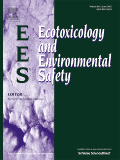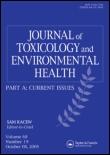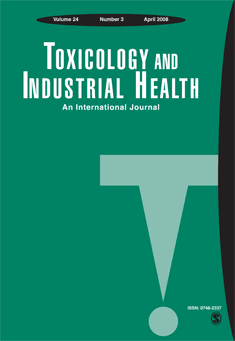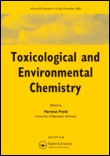
Toxics
Scope & Guideline
Elevating standards in chemical safety and health.
Introduction
Aims and Scopes
- Environmental Toxicology:
Research exploring the effects of pollutants, including heavy metals, pesticides, and pharmaceuticals, on ecosystems and human health. - Biochemical Mechanisms of Toxicity:
Studies detailing the molecular and cellular mechanisms through which toxic substances exert their harmful effects, including oxidative stress, inflammation, and apoptosis. - Ecotoxicology and Risk Assessment:
Assessment of ecological risks posed by contaminants in various environments, focusing on bioaccumulation, biomagnification, and the health risks associated with exposure to toxic substances. - Innovative Remediation Techniques:
Research on novel methods for the remediation of contaminated environments, including the use of biochar, phytoremediation, and advanced oxidation processes. - Regulatory and Policy Implications:
Investigations into the implications of toxicology research on public health policies, environmental regulations, and the development of safety standards. - Emerging Contaminants:
Focus on newly recognized pollutants, such as microplastics and per- and polyfluoroalkyl substances (PFAS), and their impacts on health and the environment. - Human Biomonitoring:
Studies utilizing biomonitoring techniques to assess human exposure to toxic substances and their potential health effects.
Trending and Emerging
- Microplastics Research:
There is a growing body of literature examining the environmental and health impacts of microplastics, including their accumulation in food chains and potential toxic effects on aquatic and terrestrial organisms. - Per- and Polyfluoroalkyl Substances (PFAS):
Research on PFAS has surged, focusing on their persistence in the environment, health implications, and remediation strategies, reflecting heightened public and regulatory concern. - Machine Learning and Computational Toxicology:
The integration of machine learning and computational approaches in toxicology is trending, allowing for predictive modeling and risk assessment of chemical exposures. - Health Effects of Air Pollution:
Increasing attention is being paid to the health impacts of air pollution, particularly related to respiratory diseases, cardiovascular conditions, and neurodevelopmental outcomes. - Cumulative Risk Assessment:
There is a trend towards evaluating the cumulative impacts of multiple chemical exposures, emphasizing the need for more comprehensive risk assessment frameworks. - Biomonitoring Advances:
Innovations in biomonitoring technologies and methodologies are emerging, providing new insights into human exposure to toxic substances and their health effects. - Environmental Justice and Toxicology:
Research addressing the intersection of environmental justice and toxicology is on the rise, focusing on the disproportionate impact of pollution on marginalized communities.
Declining or Waning
- Traditional Toxicological Studies:
There has been a noticeable decline in studies focused solely on traditional toxicological assessments, as researchers increasingly adopt integrative and interdisciplinary approaches. - Single-Chemical Exposure Studies:
Research examining the effects of single compounds is waning, with a shift towards more complex studies that consider mixtures of pollutants and their cumulative effects. - Animal Testing Models:
The reliance on traditional animal testing models is decreasing as alternative methods, such as in vitro assays and computational models, gain traction for toxicity assessment. - Historical Contaminant Studies:
Research focusing on historical contaminants, such as legacy pesticides, is becoming less prominent compared to studies on current and emerging pollutants.
Similar Journals

ECOTOXICOLOGY AND ENVIRONMENTAL SAFETY
Advancing knowledge at the intersection of toxicology and ecology.ECOTOXICOLOGY AND ENVIRONMENTAL SAFETY, published by Academic Press Inc. Elsevier Science, stands as a premier journal in the field of environmental science, specializing in the intricate relationships between toxic substances and ecological systems. With a commendable impact factor and recognized as a Q1 journal in various categories including Health, Toxicology and Mutagenesis, and Public Health, it consistently ranks among the top publications in Scopus, placing it in the 96th percentile for Medicine and Public Health. Established in 1977, this journal addresses critical issues related to environmental safety and pollution, making it an essential resource for researchers, professionals, and students alike. Although it does not offer an open access option, the journal’s commitment to publishing rigorous and impactful research makes it a vital platform for advancing the understanding of ecotoxicological risk assessments and environmental protection strategies. For those dedicated to the intersection of science and public health, ECOTOXICOLOGY AND ENVIRONMENTAL SAFETY serves as a beacon of knowledge and innovative research.

TOXICOLOGY
Leading the way in understanding toxic risks and safety measures.TOXICOLOGY, published by Elsevier Ireland Ltd, is a prestigious peer-reviewed journal specializing in the field of toxicology. With an ISSN of 0300-483X and an E-ISSN of 1879-3185, this journal provides a vital platform for researchers, professionals, and students to disseminate and access groundbreaking studies from 1973 to present, with a convergence set until 2024. Recognized for its high impact, it holds a Q1 ranking in Toxicology category and ranks #18 out of 133 in Scopus's sector of Pharmacology, Toxicology, and Pharmaceutics, placing it in the 86th percentile. While the journal is not open access, it nonetheless offers a rich collection of research articles that enhance the understanding of toxicological science and its applications. The journal's objectives encompass advancing knowledge in the toxicological evaluation of substances, promoting safety in public health, and fostering dialogue among scholars. As a key resource in the field, TOXICOLOGY plays a crucial role in advancing research and informing practices related to toxicological risks and safety assessments.

Reviews of Environmental Contamination and Toxicology
Leading the way in toxicology and environmental science.Reviews of Environmental Contamination and Toxicology is a leading journal published by SPRINGER, dedicated to advancing the understanding of environmental science, toxicology, and public health. Since its inception in 1987, this esteemed journal has established itself as an invaluable resource for researchers and practitioners alike, showcasing a wealth of peer-reviewed articles that delve into the complexities of environmental contaminants and their effects on human health and ecosystems. With an impressive impact factor and consistently ranking in the Q1 category across multiple fields including Health, Toxicology and Mutagenesis, as well as Public Health, this journal commands attention, boasting Scopus rankings that place it among the top-tier publications globally. Researchers will find that the journal provides not only in-depth reviews but also practical implications for policy and practice regarding environmental issues. Located in the heart of New York, Reviews of Environmental Contamination and Toxicology is poised to remain at the forefront of this critical field through 2024 and beyond, making it an essential addition to the library of any environmental health scholar or practitioner.

Toxicological Research
Bridging science and safety in the field of toxicology.Toxicological Research is a prominent academic journal dedicated to advancing the field of toxicology through rigorous exploration and innovative research. Published by the Korean Society of Toxicology, this journal serves as a vital resource for researchers, professionals, and students engaged in environmental science, pharmacology, and toxicology. With an ISSN of 1976-8257 and an E-ISSN of 2234-2753, Toxicological Research highlights significant findings and discussions in the realm of health, toxicology, and mutagenesis. Although not an open-access journal, it maintains a solid reputation as evidenced by its Q3 ranking in both health-related toxicology and general toxicology categories for 2023. The journal covers a broad spectrum of topics from fundamental research to applied toxicology and provides a unique platform for the dissemination of knowledge in a field that is increasingly relevant in today’s society. With an anticipated convergence period from 2008 to 2024, Toxicological Research continues to contribute vital insights to understanding the implications of toxic substances on health and the environment.

TOXICOLOGY AND APPLIED PHARMACOLOGY
Driving Discoveries in Drug Safety and EfficacyTOXICOLOGY AND APPLIED PHARMACOLOGY, published by Academic Press, Inc. Elsevier Science, stands as a leading journal in the domains of toxicology and pharmacology, with its establishment dating back to 1959. With an impact factor reflecting its academic rigor and relevance, this journal is classified in the Q2 quartile for both pharmacology and toxicology categories, underscoring its significance in the scientific community. It ranks #34 out of 133 in Toxicology and #95 out of 313 in Pharmacology according to Scopus, placing it within the 74th and 69th percentiles, respectively. The journal aims to disseminate quality research that drives advancements in understanding the interactions of drugs and toxic substances within biological systems. Researchers and professionals are invited to contribute and engage with a broad spectrum of articles that cover mechanistic studies, risk assessment, and innovative therapeutic strategies. Although the journal does not offer open access, it continues to be a crucial resource for those who seek to navigate the complex interface of drugs and their toxicological implications.

Frontiers in Toxicology
Innovating Insights into Toxicity MechanismsFrontiers in Toxicology, published by Frontiers Media SA, is a prominent open-access journal dedicated to advancing the understanding of toxicological science. Established in 2019, it serves as a vital forum for innovative research, offering insights into the pharmacological impacts and toxicological profiles of various substances. With its international reach based in Switzerland, this journal has quickly ascended in the academic community, achieving a notable Q1 ranking in Pharmacology, Toxicology and Pharmaceutics (Miscellaneous) and a Q2 ranking in Toxicology as of 2023. The journal is indexed in Scopus, where it ranks #8 out of 43 in its primary category, underscoring its influence and relevance in the field. The scope encompasses cutting-edge studies on the mechanisms of toxicity, including both human and environmental impacts, making it an essential resource for researchers, professionals, and students alike. By promoting open access to high-quality research, Frontiers in Toxicology plays a crucial role in enhancing knowledge sharing and fostering collaboration across disciplines.

JOURNAL OF TOXICOLOGY AND ENVIRONMENTAL HEALTH-PART A-CURRENT ISSUES
Pioneering Insights into Human Health and Environmental AgentsJOURNAL OF TOXICOLOGY AND ENVIRONMENTAL HEALTH-PART A-CURRENT ISSUES, published by Taylor & Francis Inc, stands as a key resource in the interdisciplinary field of toxicology and environmental health. Operating under the ISSN 1528-7394 and E-ISSN 1087-2620, this journal maintains a strong presence with a Q2 category ranking in Health, Toxicology and Mutagenesis and a Q3 ranking in Toxicology as of 2023. It aims to disseminate critical findings that address contemporary issues in toxicology and environmental health, emphasizing the implications of environmental agents on human health. The journal offers both subscription and open access options, making cutting-edge research accessible to a diverse readership. With coverage of key topics from 1998 to 2024, it is an essential platform for academics, professionals, and students seeking to stay at the forefront of environmental health sciences.

TOXICOLOGY AND INDUSTRIAL HEALTH
Empowering professionals with insights on toxic substances and safety.TOXICOLOGY AND INDUSTRIAL HEALTH, published by SAGE PUBLICATIONS INC, is a premier journal in the field of toxicology, public health, and environmental health, with a significant history dating back to 1985. With its ISSN 0748-2337 and E-ISSN 1477-0393, the journal provides a platform for disseminating groundbreaking research and comprehensive reviews that address the complexities of toxic substances in industrial and occupational settings. Despite its Q3 ranking among peers in health, toxicology, and public health, this journal is becoming increasingly influential, reflected in its growing citation metrics. Researchers and professionals benefit from its commitment to fostering knowledge in both theoretical and practical contexts, making it an essential resource for those dedicated to advancing understanding in this vital field. The journal's main objectives include promoting research addressing the implications of toxicology on health and safety standards across industries, ensuring accessibility to current studies for a global audience. Overall, TOXICOLOGY AND INDUSTRIAL HEALTH plays a critical role in bridging the gap between research and real-world applications, proving invaluable to students, professionals, and researchers alike in their pursuit of enhancing public health and environmental safety.

Exposure and Health
Connecting environmental science with health outcomes for a better future.Exposure and Health is a pioneering journal published by Springer, specializing in the interdisciplinary fields of health, toxicology, and environmental sciences. With an ISSN of 2451-9766 and E-ISSN of 2451-9685, this open-access journal exemplifies a commitment to disseminating high-quality research that informs public health practices and policies globally. Situated in the Netherlands, it boasts an impressive impact factor and ranks in the top quartile (Q1) across multiple categories in the 2023 Scopus rankings, including Health, Toxicology and Mutagenesis, Pollution, and Water Science and Technology. The journal is dedicated to advancing knowledge on the interactions between environmental factors and health outcomes, making it a vital resource for researchers, professionals, and students in these critical fields. Exposure and Health actively encourages submissions that address the challenges of exposure assessment, risk management, and the promotion of sustainable public health initiatives.

TOXICOLOGICAL AND ENVIRONMENTAL CHEMISTRY
Advancing knowledge at the crossroads of chemistry and health.TOXICOLOGICAL AND ENVIRONMENTAL CHEMISTRY is a pivotal journal published by Taylor & Francis Ltd, addressing critical intersections between environmental chemistry and toxicology since its inception in 1979. With its ISSN 0277-2248 and E-ISSN 1029-0486, the journal serves as a platform for rigorous research and innovative methodologies in pollution control, health implications of environmental chemicals, and the broader spectrum of toxicological studies. Although it currently does not offer open access, the journal's impact in the field is underscored by its Category Quartiles rankings in 2023, placing it in Q3 across Environmental Chemistry, Health, Toxicology and Mutagenesis, and Pollution categories. Furthermore, its Scopus rankings reveal its significant role within the scientific community, specifically in areas such as Environmental Science and Toxicology. The journal aspires to foster multidisciplinary dialogue and advance knowledge that contributes to environmental sustainability and public health, making it an essential resource for researchers, professionals, and students dedicated to these fields.